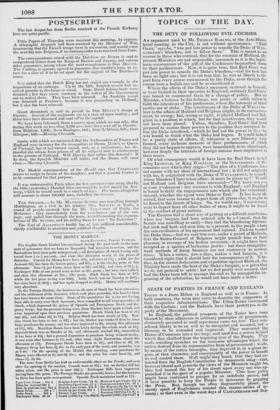TOPICS OF THE DAY.
THE DUTY OF FOLLOWING EVIL COURSES.
AN argument used by Mr. THOMAS BARING, at the Anti-Minis- terial meeting in the City, is not without speciousness. " Earl
GREY," says he, " was put into power to remedy the Duke of WEL- LINGTON'S blunders, not to follow them." This is meant as an answer to those who contend, that for the coercion of Holland, the present Ministers are not responsible, inasmuch as it is the legiti- mate consequence of the gift of the Conference bequeathed them by their predecessors. Now, it is quite true, that Earl GREY was put into power to remedy the Duke's blunders,—and his task has been no light one; but it is not true that he was ut liberty to de- part from every course commenced by the Duke, even though the course were a foolish one and he so considered it.
Where the effects of the Duke's measures centered in himself, or were limited in their operation to England, certainly Earl GREY was bound to counteract them by a change of policy. But no Minister, whatever be his feelings, can justly or safely refuse to fulfil the intentions of his predecessor, where the interests of third parties are at stake. The interference of the. Duke of WELLING. TON in the affairs of Holland and Belgium might, in its commence- ment, be wrong; but, wrong or right, it placed Holland and Bel- gium in a position in which, but for that interference, they would not have been placed. Unless, therefore, Earl GREY had been prepared to restore those powers to the position they occupied be- fore the Duke interfered,—which he had not the power to do,—he was bound to finish what the Duke had begun. It would indeed be a pretty state of affairs, if, whenever a new Ministry were formed, every inchoate measure of their predecessors, of which they did not happen to approve, were immediately to be abandoned, however deeply the interests of foreign nations were implicated in their issues.
Of what consequence would it have been for Earl GREY to tell LEOPOLD, or King WILLIAM, or the Governments of the countries over which they reign—" The plan of a Conference does not square with my ideas of international law ; it did not originate with me, it originated with the Duke of WELLINGTON, to remedy whose blunders I have taken office—it must be given up ?" Would not Holland and Belgium have answered—" We know not you or your redecessor ; our contract is with England; and England is bound to fulfil the engagements into which she has voluntarily entered, whether the agent were Duke or Earl." It has been
ob- served, that were honour to depart from all places else, it ought to be found in the hearts of kings. So, we would say, if con,istency were to depart from all other bodies of men, it ought to be found in the conduct of great nations.
The Romans had a short way of getting at a difficult conclusion, when any bargain had been entered into by a Consul, that the Senate was unwilling to ratify—they tied the blundering diploma- tist neck and heel, and sent him, as a present, to the people whom the non-ratification of his agreement had injured. Had we treated the Duke thus,—had we sent him over, under a guard of Radicals, that the States-General of Belgium might punish him at their pleasure, in revenge of his broken covenant,—it might have been accepted as a species of barbarous justica : but these straightfor- ward methods of doing business are not customary in modern times. When a nation, now-a-days, makes -a bad bargain, it is considered right that it should bear the consequences of it. Whe- ther, in the recent declaration and expedition against Holland, the Ministry have made the best of the Duke's bargain, is a point that we do not pretend to settle; but we feel pretty well assured, that had the Duke been left to manage the end'as he managed the be- ginning of the arbitration, he would not have made a better.


























 Previous page
Previous page